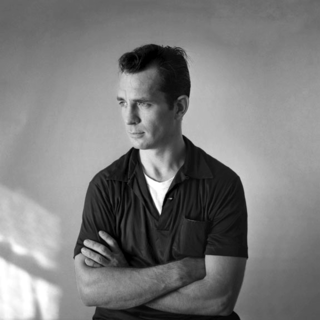
Jack Kerouac was an American novelist and poet of French-Canadian descent.
The Beat Generation was a literary movement started by a group of authors whose work explored and influenced American culture and politics in the post-war era. The bulk of their work was published and popularized throughout the 1950s. The central elements of Beat culture are the rejection of standard narrative values, making a spiritual quest, the exploration of American and Eastern religions, the rejection of materialism, explicit portrayals of the human condition, experimentation with psychedelic drugs, and sexual liberation and exploration.

Neal Leon Cassady was a major figure of the Beat Generation of the 1950s and the psychedelic and counterculture movements of the 1960s.
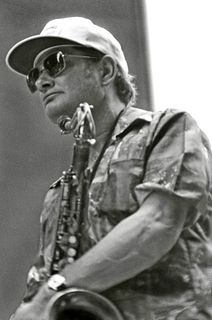
John Haley "Zoot" Sims was an American jazz saxophonist, playing mainly tenor but also alto saxophone. He first gained attention in the "Four Brothers" sax section of Woody Herman's big band, afterward enjoying a long solo career, often in partnership with fellow saxmen Gerry Mulligan and Al Cohn, and the trombonist Bob Brookmeyer.

On the Road is a novel by American writer Jack Kerouac, based on the travels of Kerouac and his friends across the United States. It is considered a defining work of the postwar Beat and Counterculture generations, with its protagonists living life against a backdrop of jazz, poetry, and drug use. The novel, published in 1957, is a roman à clef, with many key figures of the Beat movement, such as William S. Burroughs, Allen Ginsberg and Neal Cassady represented by characters in the book, including Kerouac himself as the narrator Sal Paradise.
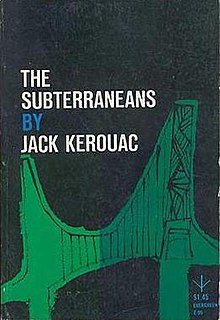
The Subterraneans is a 1958 novella by Beat Generation author Jack Kerouac. It is a semi-fictional account of his short romance with Alene Lee (1931–1991), an African-American woman, in Greenwich Village, New York. Kerouac met Alene in the late summer of 1953 when she was typing up the manuscripts of William Burroughs and Allen Ginsberg, in Allen's Lower East Side apartment. In the novella, Kerouac moved the story to San Francisco and renamed Alene Lee "Mardou Fox". She is described as a carefree spirit who frequents the jazz clubs and bars of the budding Beat scene of San Francisco. Other well-known personalities and friends from the author's life also appear thinly disguised in the novel. The character Frank Carmody is based on William S. Burroughs, and Adam Moorad on Allen Ginsberg. Even Gore Vidal appears as successful novelist Arial Lavalina. Kerouac's alter ego is named Leo Percepied, and his long-time rival Neal Cassady is mentioned only in passing as Leroy.

"Subterranean Homesick Blues" is a song by Bob Dylan, recorded on January 14, 1965, and released as a single by Columbia Records, catalogue number 43242, on March 8. It was the lead track on the album Bringing It All Back Home, released some two weeks later. It was Dylan's first Top 40 hit in the United States, peaking at number 39 on the Billboard Hot 100. It also entered the Top 10 on the singles chart in the United Kingdom. The song has subsequently been reissued on numerous compilations, the first being the 1967 singles compilation Bob Dylan's Greatest Hits. One of Dylan's first electric recordings, "Subterranean Homesick Blues" is also notable for its innovative film clip, which first appeared in D. A. Pennebaker's documentary Dont Look Back.
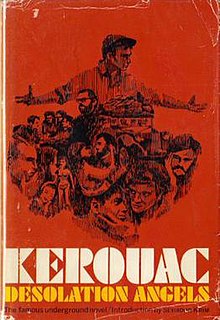
Desolation Angels is a semi-autobiographical novel written by Beat Generation author Jack Kerouac, which makes up part of his Duluoz Legend. It was published in 1965, but was written years earlier, around the time On the Road was in the process of publication. According to the book's foreword, the opening section of the novel is taken almost directly from the journal he kept when he was a fire lookout on Desolation Peak in the North Cascade mountains of Washington state. Much of the psychological struggle which the novel's protagonist, Jack Duluoz, undergoes in the novel reflects Kerouac's own increasing disenchantment with the Buddhist philosophy with which he had previously been fascinated.
"A Simple Desultory Philippic " is a song written by American singer-songwriter Paul Simon. Originally recorded for Simon's 1965 UK-only debut, The Paul Simon Songbook, it was recorded soon after by Simon and his partner, Art Garfunkel, for the duo's third album Parsley, Sage, Rosemary and Thyme.

Visions of Gerard is a 1963 novel by American Beat writer Jack Kerouac. It is the first volume in Kerouac's "Duluoz Legend". Unique among Kerouac's novels, Visions of Gerard focuses on the scenes and sensations of childhood as evidenced in the tragically short yet happy life of his older brother, Gerard. Kerouac paints a picture of the boy as a saint, who loves all creatures and teaches this doctrine to four-year-old Jack. Set in Kerouac's hometown of Lowell, Massachusetts, it is a beautiful but unsettling exploration of the meaning and precariousness of existence.

Poetry for the Beat Generation is the debut album of American novelist and poet Jack Kerouac and was originally released in 1959.

Mexico City Blues is a poem published by Jack Kerouac in 1959 composed of 242 "choruses" or stanzas. Written between 1954 and 1957, the poem is the product of Kerouac's spontaneous prose, his Buddhism, and his disappointment at his failure to publish a novel between 1950's The Town and the City and 1957's On the Road.
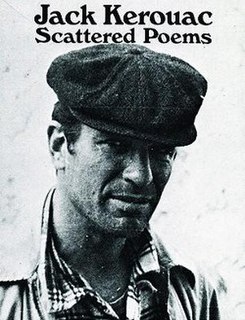
Scattered Poems is a collection of spontaneous poetry by Jack Kerouac. These poems were gathered from underground and ephemeral publications, as wells as from notebooks kept by the author. Some poems include: "San Francisco Blues," the variant texts of "Pull My Daisy," and American haikus.
Jack Kerouac was an American novelist and poet. He is considered a literary iconoclast and, alongside William S. Burroughs and Allen Ginsberg, a pioneer of the Beat Generation. Kerouac is recognized for his method of spontaneous prose. Thematically, his work covers topics such as Catholic spirituality, jazz, promiscuity, Buddhism, drugs, poverty, and travel.

Kerouac: Kicks Joy Darkness is a 1997 spoken word tribute album featuring late Beat Generation writer Jack Kerouac's work performed by various artists. Notable performers include: Michael Stipe, Allen Ginsberg, Hunter S. Thompson, Johnny Depp, and Patti Smith. Ginsberg's performance of "The Brooklyn Bridge Blues" is missing the final tenth chorus. This was due to a faxing machine error which stuck the last pages together when Ginsberg was faxed the lyrics. The final chorus is read by Eric Andersen instead, recorded on a DAT recorder from the Brooklyn Bridge.
A haiku in English is a very short poem in the English language, following to a greater or lesser extent the form and style of the Japanese haiku. A typical haiku is a three-line observation about a fleeting moment involving nature.

Book of Haikus is a collection of haiku poetry by Jack Kerouac. It was first published in 2003 and edited by Regina Weinreich. It consists of some 500 poems selected from a corpus of nearly 1,000 haiku jotted down by Kerouac in small notebooks.

Readings by Jack Kerouac on the Beat Generation is the third and final spoken word album by the American novelist and poet Jack Kerouac, released in January 1960 on Verve Records. The album was recorded during 1959, prior to the publication of Kerouac's sixth novel, Doctor Sax.

Kerouac's Last Dream is an album by American folk musician Ramblin' Jack Elliott, released in 1981.
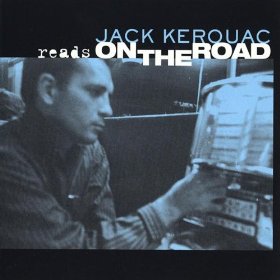
Jack Kerouac Reads On the Road is a compilation album by American novelist and poet Jack Kerouac. The centrepiece of the record is a 28-minute recitation by Kerouac from his book On the Road that was recorded on an acetate disc in the 1950s but thought lost for decades, and had only recently been rediscovered at the time of release. Other tracks feature Kerouac singing renditions of Jazz hits from the 1920s, 1930s and 1940s alongside songs and poems of his own composition.




















